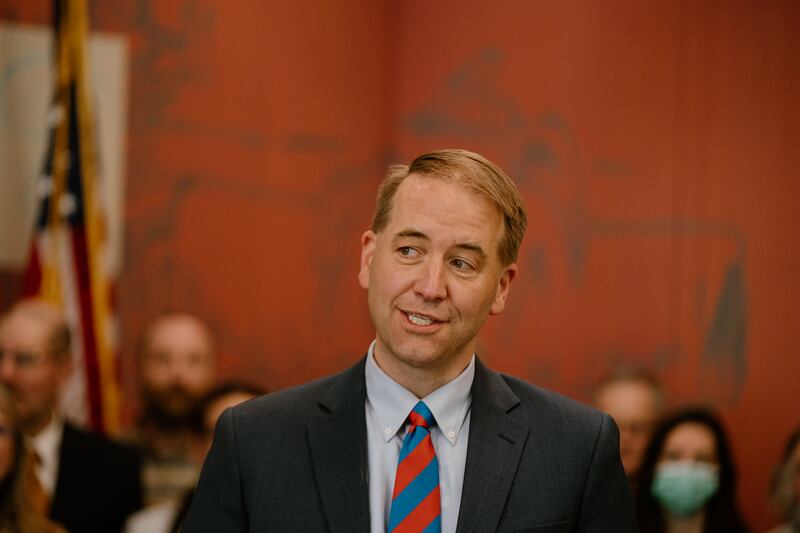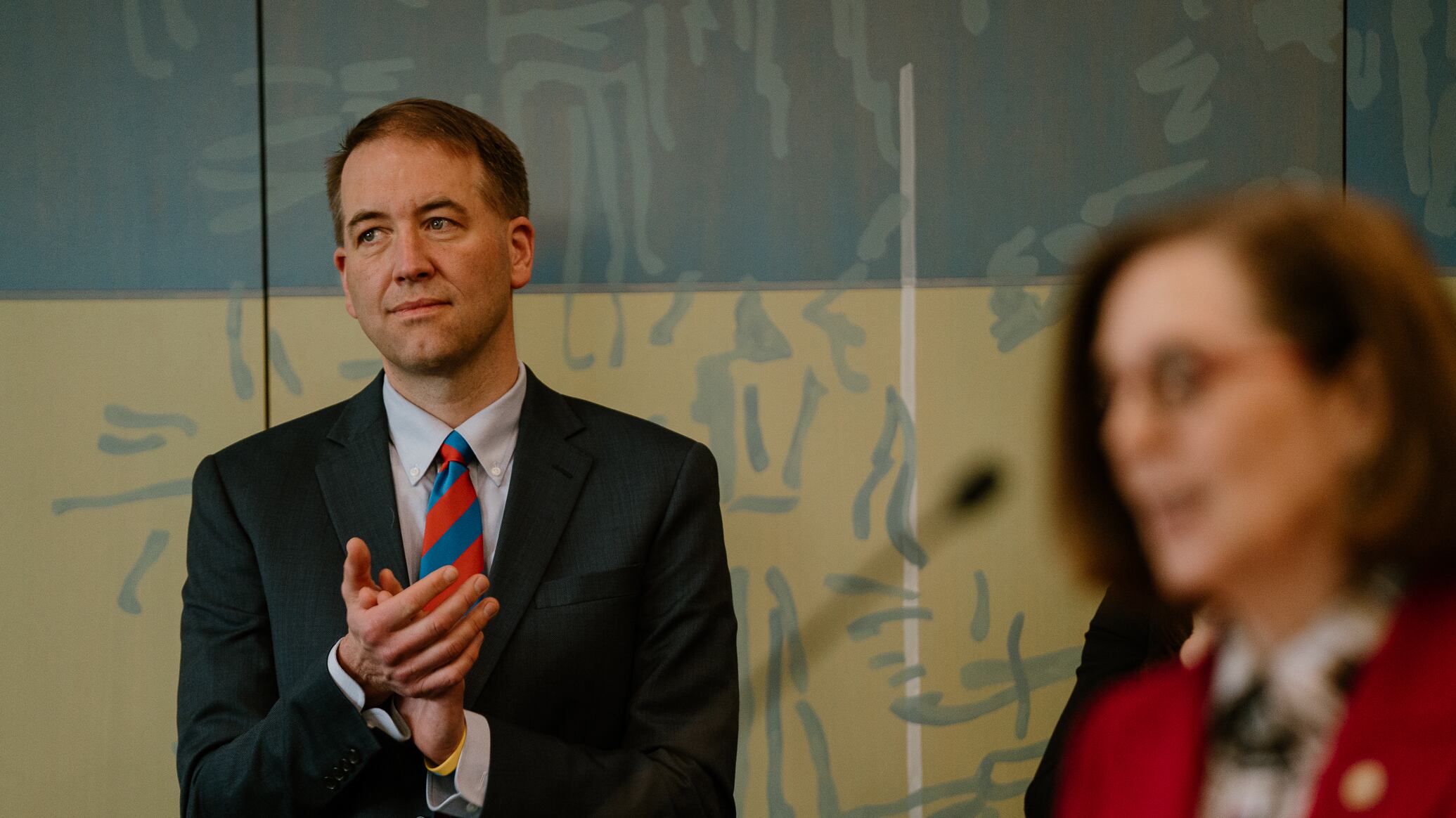Tobias Read hopes he can ride record-high voter dissatisfaction to the Democratic nomination for governor in the May 17 primary.
Read, who is midway through his second term as state treasurer, is certainly trying to position himself as an outsider, blasting schools for not reopening fast enough and elected officials at every level for not acting with sufficient urgency on homelessness.
“Oregon needs new leadership and a new direction,” Read says in his campaign materials. “We can’t afford more of the same in Salem.”
That’s a tough sell from a man who has held public office since 2007. A sober plow horse of a politician, Read has seen his principal opponent, former House Speaker Tina Kotek (D-Portland), grab the endorsements of key unions as well as environmental, reproductive choice, and other progressive groups.
Although pollsters, such as John Horvick of Portland’s DHM research, say it’s Kotek’s race to lose, some leading Democrats—including former Govs. Barbara Roberts and John Kitzhaber—have endorsed Read, a business-friendly moderate less in thrall than Kotek to the public employee unions that dominate Oregon Democratic politics.
Read wins plaudits on all sides as a genial fellow who has been careful to maintain good relationships. But he’s also earned a reputation as someone guided more by his ambitions for the next office than by any particular vision of how to make Oregon a better place.
Bill Parish, a Portland investment adviser who monitors the state treasury, says Read’s made little effort to lead on important financial issues, such as the Public Employees Retirement System, housing finance, or the divestment of controversial pension assets. “He’s done nothing except promote himself for governor since the time he took office,” Parish says.
Read pushes back, touting such legislative accomplishments as diverting unclaimed class action lawsuit funds to fund legal aid, and his work at the treasury: improving the state’s college savings program, implementing a retirement program for workers who have none, and maintaining high returns on pension investments.
“What you get with me is sort of the sweet spot,” Read says. “A person who knows how to get things done, but who is also not afraid to acknowledge that what we’re doing is not working.”
Read caught a big break in February when the Oregon Supreme Court ruled that former journalist Nicholas Kristof, a political newcomer who was challenging Kotek and Read, didn’t meet Oregon’s residency requirement.
Although Read has attracted some Kristof backers, including Kristof’s wife, Sheryl WuDunn, his pool of potential supporters has been thinned by the insurgent candidacy of former state Sen. Betsy Johnson (D-Scappoose). Johnson, running unaffiliated, has dominated business support—she’s outraised Read 5 to 1 so far.
That’s perhaps because despite his desire to don the outsider’s mantle, Read’s an entrenched Salem insider, whom his onetime mentor, state Sen. Mark Hass (D-Beaverton) says is best known for his caution.
“If you play it safe in politics, you won’t make any friends, you won’t make any enemies, and you won’t get anything done,” Hass says. “That’s Tobias.”
Former state Rep. Brent Barton (D-Clackamas), who served in the Legislature with Read, says in a political atmosphere dominated by extremes on the left and right, the treasurer could be a steadying, unifying leader. “There is no harder-working person in Salem than Tobias Read,” Barton says. “He takes governance seriously.”

Read, 46, grew up in Idaho. He began college at Swarthmore in Pennsylvania but graduated from Willamette University. Afterward, he moved to Washington, D.C., to work for then-U.S. Treasury Secretary Larry Summers. There, he befriended another Summers aide, Sheryl Sandberg, now chief operating officer of Facebook. Sandberg has contributed $46,000 to Read’s past campaigns but nothing so far to his race for governor.
Read then earned an MBA from the University of Washington. He went to work for Nike as a children’s shoe developer from 2004 to 2012. He says the company’s drive for innovation taught him lessons he brings to politics.
“If you had a credible case to make and you got the right audience,” he recalls, “you could say, ‘You’ve got the business model entirely wrong.’ And you might have a chance of getting somewhere with that argument.”
He says he’ll similarly challenge the status quo if elected, even though he entered the Legislature in 2007, the same year as Kotek.
For a decade, Read served alongside Kotek. At various times, he was the speaker pro tem, majority whip, and chair of the House Transportation and Higher Education committees. He left the Legislature to run for state treasurer in 2016. His Republican opponent in that race and again in 2020 was Jeff Gudman.
Gudman, an investor and two-term Lake Oswego city councilor, offers a blunt assessment of Read. “He’s a nice guy,” Gudman says, “but he doesn’t have the financial background to be treasurer and is only using the office as a stepping stone to run for governor.”
He scoffs at Read’s portrayal of himself as an outsider. “I thought, ‘Wait a minute, you’ve been in office for 15 years, and I’ve never heard you say a word of opposition to what’s been happening.’”
Another critic, Parish, points to a high-profile issue at the treasury as an example of Read’s reluctance to rock the boat. The Oregon Investment Council, of which Read is one of five members, put money into a limited partnership that purchased NSO Group, the Israeli spyware maker whose products some governments have allegedly used to target human rights activists and the media.
Despite calls for the OIC to sell its position, Oregon is still the biggest investor in NSO’s owner. (Read says the treasury is examining its legal options, but he declined to comment further.)
John Russell, a Portland investor who serves on the OIC, says he and Read disagree on NSO, but the treasurer has impressed him. “He is supremely competent,” Russell says. “He may be underrated because the treasurer’s job is largely under the radar.”
As evidence of his effectiveness, Read points to a program he worked on as a lawmaker and implemented as treasurer called Oregon Saves, which helps employers start retirement plans for their workers. Oregon Saves has helped about 113,000 workers put away $153 million.
Perhaps the highest-profile issue Read has been associated with is the 91,000-acre Elliott State Forest northeast of Coos Bay. In 2016, Read campaigned on saving the forest from being sold by the State Land Board.
But then, after winning election and joining the land board, Read voted to sell the forest.
Environmentalists revolted. Read reversed course and, as one of three members of the board (the governor and secretary of state are the other two), he led efforts to keep the forest in public ownership as part of Oregon State University.
Read’s original vote to sell, however, is the legacy environmental groups remember. The Oregon League of Conservation Voters ran its most expensive campaign ever to pressure Read to change his vote.
“The reason we’ve endorsed Kotek is she’s the candidate for governor who won’t need to be pushed and held accountable to get to those places,” says OLCV executive director Doug Moore. “The challenge we’ve had with Tobias is we’ve had to do those kinds of things. When he gets there, he does good work, but the problem is, I don’t think instinctively or value-wise he starts in that place.”
Read rejects that criticism. He says once he was elected, he needed to act as a fiduciary of public funds. He says rather than flip-flopping, he showed boldness and creativity in ultimately helping find an alternative to the sale.
“There’s a time to take risks and there’s a time to be very prudent,” Read says.
Even as Gov. Brown signed a bill into law this week memorializing the saving of Elliott, members of the forest’s advisory committee are reluctant to name Read as the chief agent of the final compromise.
“I think the most credit should go to the member of Elliott State Forest advisory team,” says Keith Tymchuk, a former six-term mayor of Reedsport.
Others see Read’s decision to admit publicly he’d erred in his original vote to sell the forest as admirable—and perhaps a signal that he can divert Oregon from its current course.
“That’s what I want out of my elected officials: people who aren’t afraid to admit that maybe they reached the wrong decision the first time,” says Coos County Commissioner Melissa Cribbins. “That’s how I see the treasurer; he’s pragmatic. He tries to find a solution.”
Correction: This story originally said Read help divert unclaimed class action funds to public defense services. In fact the money goes to legal aid for civil cases. WW regrets the error.


